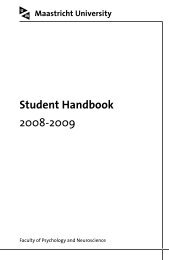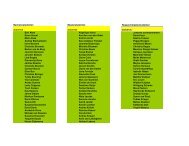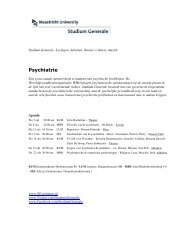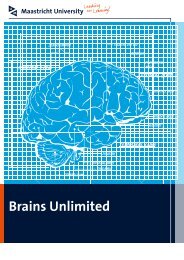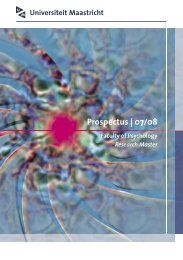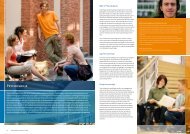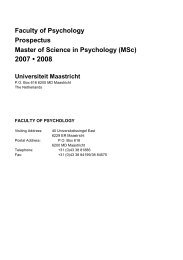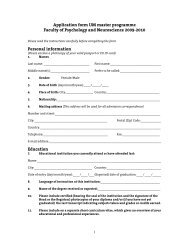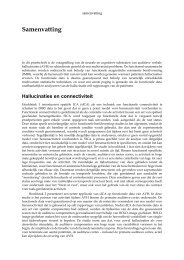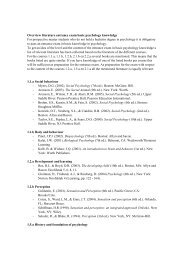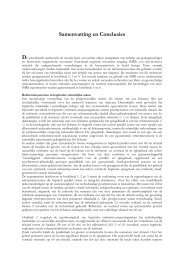Prospectus | 08/09 - Psychology and Neuroscience - Maastricht ...
Prospectus | 08/09 - Psychology and Neuroscience - Maastricht ...
Prospectus | 08/09 - Psychology and Neuroscience - Maastricht ...
Create successful ePaper yourself
Turn your PDF publications into a flip-book with our unique Google optimized e-Paper software.
Chapter 3 - Specialization Fundamental <strong>Neuroscience</strong><br />
<strong>and</strong> brain material of mammals at both the macroscopical (visual inspection) <strong>and</strong><br />
microscopical level. For the latter this course introduces the principles of multi-colour<br />
fluorescent labeling of tissue sections using antibodies <strong>and</strong> fluorescent receptor<br />
lig<strong>and</strong>s. In addition, various other methods of modern brain imaging (both in vivo <strong>and</strong><br />
ex vivo) will be discussed.<br />
Literature<br />
The students will be provided with selected chapters from a textbook.<br />
51<br />
Instructional Approach<br />
The instructional approach will comprise some systematic lectures <strong>and</strong> various<br />
practical elements such as dissection of sheep brains, studying of microscopical slices<br />
of the rat brain <strong>and</strong> working with plastic human brain models.<br />
Form of Assessment<br />
Written examination <strong>and</strong> evaluation of practical performance.<br />
| 414FN Neurodegeneration <strong>and</strong> Brain Damage - 4 credits<br />
Coordinator: Fred van Leeuwen., Psychiatry & Neuropsychology (FHML), Phone 38 31044 ,<br />
50 Universiteitssingel, Room 1.116, E-mail: f.vanleeuwen@np.unimaas.nl<br />
Description of the Course<br />
This course provides an in depth description of neurodegenerative processes that occur<br />
during the development of neurodegenerative diseases, some of the most debilitating<br />
disorders that include Alzheimer’s Disease, Parkinson’s Disease, Huntington’s disease<br />
<strong>and</strong> Amyotrophic Lateral Sclerosis <strong>and</strong> also during brain damage. Although clinical<br />
manifestations of these neurodegenerative diseases are different, they share common<br />
features in neuropathology <strong>and</strong> in the underlying molecular mechanisms. The aim<br />
of this course is to gain insight into the neurodegenerative processes, such as the<br />
deposition of aggregated proteins, the loss of neurons <strong>and</strong> synapses, alterations in<br />
neurogenesis <strong>and</strong> inflammatory processes, <strong>and</strong> alterations in metabolic/oxidative state,<br />
<strong>and</strong> whether these are cause or consequence of the disease. Moreover, it will cover the<br />
influences of genetic <strong>and</strong> environmental factors on disease progression <strong>and</strong> strategies<br />
for therapy. Major emphasis will be on the molecular, that is neurochemical <strong>and</strong><br />
neurobiological, mechanisms that affect disease progression, using transgenic animal<br />
models as well as brain cell cultures.<br />
Literature<br />
Recent journal articles <strong>and</strong> book chapters.<br />
Instructional Approach<br />
Lectures, group meetings <strong>and</strong> practical sessions.



